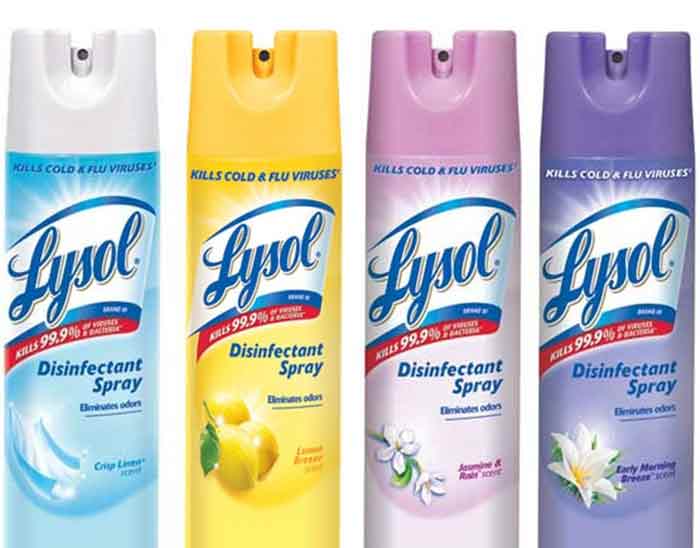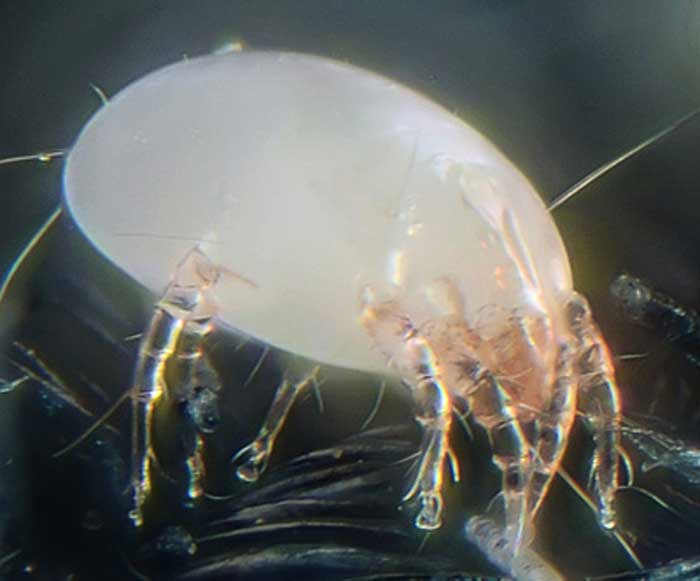Using Lysol is one of the many ways used to eliminate dust mites This article discusses the use of Lysol to kill dust mites. Find out if this chemical really kills these microscopic mites, its ingredients, how it is used and the safety measures that must be taken when using it.
Table of Contents
What is Lysol and why use it?
Lysol is a mixture of soft soap and cresols and is used as a disinfectant. It can also be used as a cleaner and air freshener.
Lysol comes in many forms; Lysol disinfectant spray, Lysol concentrate disinfectant, and Lysol disinfectant wipes.[1] It has been tested and found to be effective in killing dust mites.
How does it Kill/What makes it Effective?
It is made of products which can eliminate 99 percent of germs that cause illnesses and allergies. The ingredients making up Lysol spray explain its ability to kill dust termites. The main ingredients are as follows;
- Benzyl ammonium saccharinate
- Alkyl dimethyl
- Ethanol alcohol 40
- Antiseptic agents such as isopropyl alcohol and p-Chloro-o-benzylphenol which are designed to remove odors and sanitize
How to use it
Lysol spray when used well will effectively kill dust mites. Below are steps which when followed yield great results;
- Clean the places suspected to have dust termites very well in order to get rid of as much dust as possible.
- Inspect your floors, along floorboards and furniture to trace any dust. On areas where dust appears, spray with as much of Lysol spray as possible until the surface is seen to be wet. The disinfecting power of Lysol spray prevents possible accumulation of dust mites.
- Give the spray time to completely dry. In the case where the spray is used on surfaces that children may come into contact with, you are advised to use a clean damp cloth to wipe the surfaces.
- Repeat the procedure each single day and within no time no more allergies will be experienced since all dust termites will be eliminated.
Since most of ingredients making up the Lysol spray are not organic, you are advised not to spray Lysol in your bedroom.
If you must use Lysol to kill dust mites from your bedroom, you should go for the Lysol wipes.
These wipes are effective in removing dust mites and other allergens from surfaces.
Precautions and safety
As much as Lysol spray is a great disinfectant, you must be careful when using it since it can be harmful to your family.
Just like any chemical products, precautionary measures must be taken when using the spray as will be indicated on the bottle. Below are important factors you must keep in mind when using Lysol spray;
- Inhalation
Lysol contains ethanol and when inhaled, it may cause several health problems. If you experience a headache, cough, fatigue, or unusual sickness, it is likely that those are the side effects of ethanol in the spray. This will be discussed further below.
In the case where you experience an increased rate of breathing, it is because of the carbon dioxide also contained in the spray. Where this gas is inhaled for long periods, it is likely to lead to death and you therefore need to be extremely careful.
- Flammable
The first thing you should do before using a chemical spray is read the instructions on the side of the bottle.
For instance, Lysol spray instructions are that it should not be used near heaters, open flames, fireplaces or stove burners. You also should never smoke when using Lysol.
Since it flammable, you are advised to store Lysol products under temperatures that are below 130 degrees Fahrenheit. You do not want to burn your entire house when your intention was simply to eliminate dust mites.
- Skin contact
When using Lysol, you may experience irritation which eventually results to a rash and so much itching. It is ethanol contained in Lysol which is responsible for the skin reaction. U.S Department of Health and Human Services Household Products Database explain that you will experience mild irritation on your skin if you repeatedly use Lysol or if you are exposed to it for long periods.[2]
As soon as you experience any irritation on your skin, use soap and a lot of water to wash your skin. In case the irritation worsens, see a dermatologist for immediate control of any further skin damage.
Following the above possible dangers, there are precautions that should be taken for safe us of Lysol spray as explained below;
- Ensure the area is well ventilated
As mentioned above, inhalation of any droplets of the Lysol spray may take you to a death bed.
This is why you should never use the spray in a room which is not properly ventilated. There should be free flow of fresh air from outside in the area where you intend to use the spray.
During the process of spraying Lysol on the dusty places, step out to get some fresh air from time to time.
This is because, although using the spray in a ventilated area is said to be safe, your breathing system may react differently. In case of dizziness, stop spraying and get as much fresh air as possible.
- Ensure the spray does not come into contact with your skin, clothing or your eyes
Lysol as mentioned above may irritate not only your skin but your eyes as well. As soon as you experience the irritation, use cool water and soap; and clean the affected area for about fifteen minutes.
Make it a habit to take a shower immediately after using Lysol spray even when no irritation has been experienced. Wash the clothes you had on when spraying Lysol as well.
- Never ingest Lysol disinfectant spray
You should never use Lysol spray near food substances or drinking water.
If you accidentally ingest it, you are advised to immediately rinse your mouth with plenty of plain water. After rinsing your mouth, drink some water to dilute any chemicals that are already in your system.
If you feel sick even after rinsing your mouth and drinking water, seek medical assistance as soon as possible. Any food that is suspected to have come into contact with the spray should be disposed immediately.
- Cover your body well when using the spray
Wearing a pair of trousers and a long sleeved shirt as well as socks when using Lysol spray is advisable.
You should also wear protective gloves since your hands stand the highest risk of getting into contact with the Lysol spray.
- Always listen to your body when using this spray
If you suddenly experience allergic reactions such as breathing problems, a cough, nausea, hives, or persistent irritation of the skin, stop using the spray and ask someone else to help you with the spraying.[3]
It is important to know how safe it is for you to use the Lysol spray. The spray is likely to cause more adverse effects as compared to wipes.
A few minutes after you begin using the spray, you need to watch out for a few symptoms which are associated with people who generally experience allergic reactions following use of chemical cleaning products.
It is the chemicals used in the spray that are likely to trigger allergies in people. When you experience any of the symptoms below, you should discontinue use of the spray or probably ask someone else to spray the dust mites on your behalf;
- Sneezing
If not so long after using the spray you experience unusual sneezing, it is an indicator that you are allergic to one or more of the chemicals making the Lysol spray. You should therefore discontinue its use.
- Itchy eyes
Most disinfectant sprays are sprayed to the air as opposed to surfaces. This makes it easy for the spray to get into contact with your eyes. Where your eyes become extremely itchy and watery, you will need to stop using the spray and clean your eyes.
- Difficulty in breathing
As advised above, you should only spray Lysol if the room is well ventilated.
Even that, if you are among the people with weak breathing systems, you may not even spray the chemical for long before you start experiencing difficulty in breathing. This shows you have a chemical allergen problem.
- Hives
There are people whose skin is very sensitive and if you are one of them, you will realize that your skin breaks out into hives or red bumps when exposed to certain chemicals.
If you notice such bumps on your skin some minutes into spraying Lysol, stop immediately as the hives may increasingly spread all over your body.
More about Dust Mites
- Facts about dust mites, how they look like in pictures, signs and frequently asked questions
- Dealing with dust mites bites
- How to get rid of dust mites naturally and with use of chemicals
- Dealing with Dust Mite Allergy
- Best Essential Oils for Dust mites
Sources
[1] http://www.gutenberg.org/files/21724/21724-h/21724-h.htm#Page_89
[2] https://hpd.nlm.nih.gov/cgi-bin/household/brands?tbl=brands&id=18001894
[3] https://www.hunker.com/13419103/is-lysol-disinfectant-spray-dangerous

